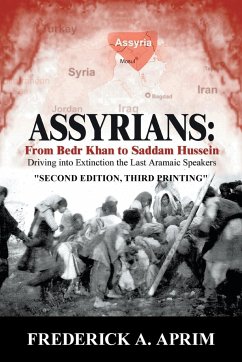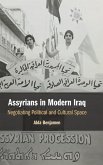Throughout the Christian Era, the Assyrians have faced an immense tragedy through persecution, oppression, and massacres. The Assyrian tragedy in Mesopotamia continued intermittently during the Sassanid Persians (A.D. 226 - 637), Seljuk Turks invasion of the eleventh century, Mongols invasion in 1258, Tamerlane's destruction that began in 1394, the Saffavid Persians in early sixteenth century and during the rule of the Ottoman Turks since the middle of the sixteenth century. Throughout the nineteenth and early twentieth centuries, Turks and Kurds committed numerous massacres against the Assyrian Christians in their secluded mountains of northern Mesopotamia and in Tur Abdin region in modern southeastern Turkey. As the Ottoman Empire entered WWI, it declared jihad (holy war) against its Christian subjects. Backed by Kurds, the Turkish army invaded northwestern Persia (Iran) and committed further atrocities against the Assyrian refugees who fled the Ottoman territories and against Assyrians of Persia as well. The jihad transformed into an ethnic genocide against the Assyrians that was perpetrated by the Turkish state and Kurdish warlords. This genocide continues to this very day due to the policies of the Kurds in northern Iraq, southeastern Turkey, and northeastern Syria. The Assyrians lost two-thirds of their population and most of their homelands in northern Mesopotamia during WWI alone. Since the creation of the modern Middle Eastern states after the partition of the Ottoman Empire post WWI, the Assyrians have faced and continue to face a systematic Arabization, Turkification, and Kurdification policies by Pan- Arab governments, Pan-Turkish governments, and by Kurdish political parties. Hundreds of thousands of Assyrians have fled their homelands seeking shelter in Europe, United States, and Australia. Furthermore, the rise of fundamentalism in the Middle East is posing another serious threat to the survival of the remaining Assyrians and to other Christian communities in the Middle East. FOREWORD After the establishment of Islam as a state religion in the Fertile Crescent by the eighth century, the ferocious attacks by the Timurids, plundering the region as they descended from Central Asia in the fourteenth century, drove many Christian Aramaic speakers who did not convert to Islam into the mountains of the Taurus, Hakkari, and the Zagros for shelter. Others remained in their ancestral villages on the Mosul (Nineveh) Plain only to face heavy pressure to assimilate into Arab culture. The greatest catastrophe to visit the Assyrians in the modern period was the genocide committed against them, as Christians, during the Great War. From the Assyrian renaissance experienced when, miraculously, they became the objects of Western Christian missionary educational and medical efforts, the Assyrians fell into near oblivion. Shunned by the Allies at the treaties that ended WWI and after, Assyrians drifted into Diaspora, destructive denominationalism, and fierce assimilation tendencies as exercised by chauvinistic Arab, Persian and Turkish state entities. Today they face the growing clout of their old enemies and neighbors, the Kurds, another Muslim ethnic group that threatens to control power, demand assimilation, and offer to engulf Assyrians as the price for continuing to live in the ancient Assyrian homeland. As half of the world's last Aramaic-speaking population has arrived in unwanted Diaspora, some voices are making an impact, including that of Frederick Aprim. -Eden Naby, PhD AFGHANISTAN: MULLAH, MARX AND MUJAHID (Westview, 2002) THE ASSYRIAN EXPERIENCE (Harvard College Library, 1999)
Bitte wählen Sie Ihr Anliegen aus.
Rechnungen
Retourenschein anfordern
Bestellstatus
Storno








